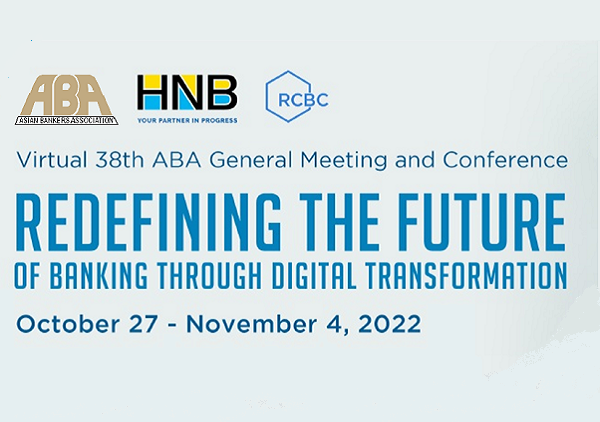"Redefining The Future of Banking Through Digital Transformation"
October 27 - November 4, 2022
Summary of Conference Proceedings
Introduction
Some 800 representatives from banks, regulatory authorities, multilateral financial organization, the academe, and bank service providers registered for the 38th ABA Conference held virtually on 1-4 November 2022. It was the second annual gathering of the ABA conducted in an online format – following the first one held in August 2021 -due to the ongoing COVID-19 pandemic.
The four-day online event will carry the theme “Redefining the Future of Banking through Digital Transformation”. It aimed to provide another valuable platform for ABA members to meet – although once again virtually – to exchange views with invited speakers on: (a) how digital transformation will determine the direction the banking industry is taking, and (b) why it is imperative for banks to consider technological advances in their strategies and take advantage of the opportunity to make themselves customer-centric, innovation-driven, and future-ready.
Experts from the banking sector, government, multilateral and regional organizations, and the academe were invited to share their views on four important topics, namely:
“The Digital Transformation Journey”
“Asian Banks: Navigating Through a Digitized Environment”
“Promoting a Sustainable World: Fostering Green Finance”
“Emerging Trends in Banking and Financial Services.”
Opening Ceremony
November 1, 2:00pm – 2:15 pm, Taipei Time
 The Opening Ceremony was held on November 1, 2022, from 2:00 PM to 4:00 PM, Taipei Time. ABA Chairman Mr. Eugene S. Acevedo, President and CEO of Rizal Commercial Banking Corporation (RCBC) from the Philippines, gave the Welcome Remarks.
The Opening Ceremony was held on November 1, 2022, from 2:00 PM to 4:00 PM, Taipei Time. ABA Chairman Mr. Eugene S. Acevedo, President and CEO of Rizal Commercial Banking Corporation (RCBC) from the Philippines, gave the Welcome Remarks.
In his Welcome Remarks, Mr. Acevedo said that the times have remained challenging for many economies worldwide and that for banks in particular, the pandemic has generated multifaceted crises that have threatened the performance, survival, and growth of banks in many developing countries, particularly in those where banks play a dominant role in the economy.
Mr. Acevedo noted that while many banking institutions have successfully navigated the immediate pressures of the pandemic, they are also aware that how they respond to the still ongoing health crisis will determine how they will successfully rebuild for the future. Providing support to their customers remains crucial moving forward, and this will require banks to deploy the tools they have developed over the past decade or so to lead a coherent and extensive response to mostly uncharted territory, he noted.
This, he stressed, will require banks to refocus on really understanding their customers’ needs, and in parallel, adapting their operating models and ways of working to ensure the best efficiency and resiliency measures that will result in an agile organization, to help them weather the recovery and attain sustainable growth.
The ABA Chairman said that the global economy is becoming increasingly digitalised, and some of the emerging technologies have the potential to be truly transformative, even as they pose new challenges. Today, more than ever, industries – and banks in particular – need to break new ground in innovation-driven development, he observed.
Helping customers and businesses recover from the economic impact of COVID-19 means helping them focus on productive economic activity. Banking must be a seamless enabler of that activity. This means enabling customers and businesses to manage their financial needs in the right way. Increasingly, that means digitally. Mr. Acevedo stated.
The ABA Chairman therefore expressed his hopes that the Conference would provide bankers the opportunity to examine how various challenges and trends they are seeing today are coming together to influence the future of banking.
Plenary Session One
November 1, 2:15pm – 04:00 pm, Taipei Time
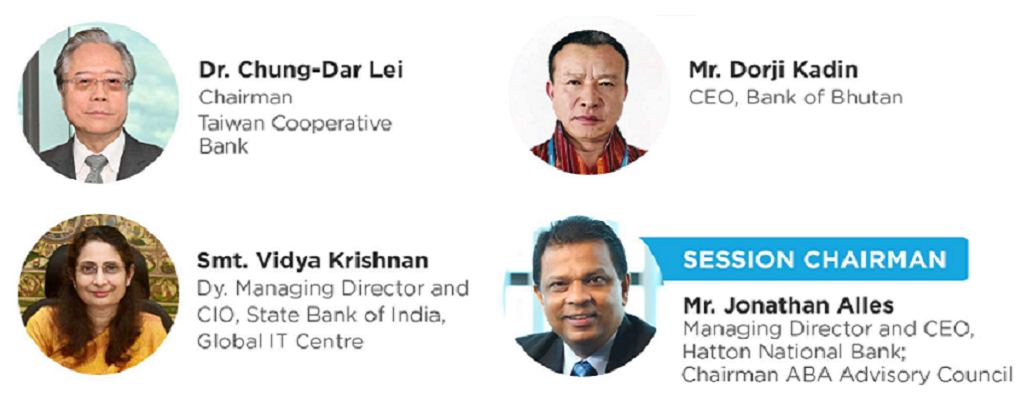
Plenary Session One, which followed immediately after the Welcome Remarks of Chairman Acevedo, addressed the topic on “The Digital Transformation Journey”. Chaired by Mr. Jonathan Alles, Managing Director and CEO of Hatton National Bank from Sri Lanka, the session featured speakers who shared their organization’s digital journey and outlined their perspectives on the main areas of digital transformation that they adopted, including those involving process transformation, business model transformation, data science, and cultural and organizational transformation.
The three speakers and summaries of their respective presentations are as follows:
Dr. Paul Chung-Dar Lei, Chairman, Taiwan Cooperative Bank (TCB), who covered the six challenges faced by Taiwan’s financial industry in 2022, traced the evolution in technology and bank digitalization that has led to a combination of finance and technologies for transformation strategies, cited the digital transformation of TCB and the banking industry of Taiwan as a whole, and described the two most important future trend, namely banking-as-a-Platform and open banking- ecosystem.
Mr. Dorji Kadin, Chief Executive Officer, Bank of Bhutan, who elaborated on the Bank’s digital journey, the challenges and opportunities it encountered, and how the Bank sees the future of banking would be.
Smt Vidya Krishnan, Deputy Managing Director and Chief Information Officer, State Bank of India (SBI), who highlighted the strategic objectives of SBI’s digital transformation and the programs it put in place to achieve them, and shared its key learnings from the experience.
The presentations of Dr. Paul Chung-Dar Lei and Mr. Dorji Kadin can be downloaded HERE.
The 1st. session of the 38th ABA Conference can be viewed here.
Plenary Session Two
November 2, 2:00pm – 4:00pm, Taipei Time
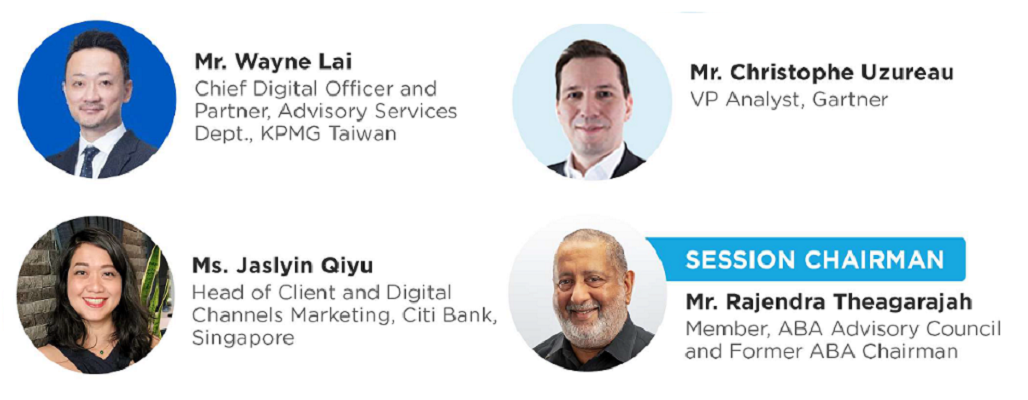
Plenary Session Two focused on the topic “Asian Banks: Navigating Through a Digitized Environment” . The two-hour session was chaired by Mr. Rajendra Theagarajah, Member, ABA Advisory Council and Former Managing Director and CEO of Hatton National Bank. Invited speakers exchanged views on how banks can better understand and fulfill customer needs, make the customer journey personal, automated, safe enough for them to cope with cybersecurity and customer fraud, and cohesive within a single ecosystem.
The speakers included the following:
Mr. Wayne Lai, Chief Digital Officer and Partner, Advisory Services Dept., KPMG Taiwan; who spoke on Building a True Customer Centric Connected Bank in the Digital Era, highlighting some of the emerging trends in the market and sharing some successful cases of successful experience of banks and other organizations in their digital transformation journey
Mr. Christophe Uzureau, VP Analyst, Gartner; who shared his perspectives on How the Banking Industry Can Create Business Value From Metaverse, identifying new roles and new opportunities for the banking industry (e.g., new engagement models, new digital asset classes, and new business models)
Ms. Jaslyin Qiyu, Head of Client and Digital Channels marketing, Citi Bank, Singapore, who shared her perspectives on how to create a safe yet agile digital banking ecosystem, citing the importance of building trust (at the consumer, industry, and national levels), to make security as everyone’s responsibility and the need for a digital banking ecosystem, and to establish experience to ensure the ability to scale and navigate with agility.
The presentations of Mr. Wayne Lai and Ms. Jaslyin Qiyu can be downloaded HERE.
The 2nd. session of the 38th ABA Conference can be viewed here.
Plenary Session Three
November 3, 02:00 PM – 04:00 PM, Taipei Time
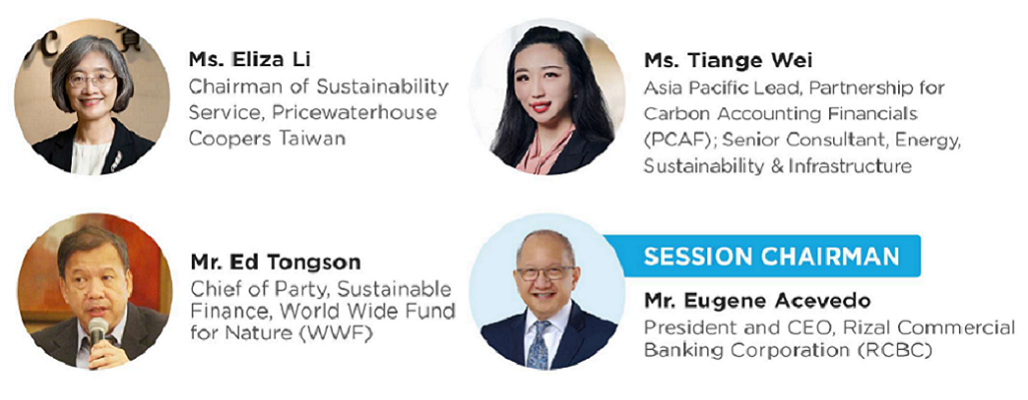
Plenary Session Three addressed the topic “Promoting a Sustainable World: Fostering Green Finance.” Chaired by Mr. Eugene Acevedo, ABA Chairman and President and CEO, Rizal Commercial Banking Corp. (RCBC), the two-hour session featured speakers who shared their insights on the need for greening the financial system and the role of financial governance, examined the state of green lending and investment in Asia, and provided an overview of market innovations and green financial governance initiatives across Asia.
The Invited Speakers included the following:
Ms. Eliza Li, Chairman of Sustainability Service, PricewaterhouseCoopers Taiwan, who spoke about ESG trends in the capital market and how Taiwan fosters sustainable finance (what are the policies driving the development of Taiwan’s sustainable financial market and sustainable finance measures taken by Taiwan.
Ms. Tiange Wei, Asia Pacific Lead, Partnership for Carbon Accounting Financials (PCAF); Senior Consultant, Energy, Sustainability & Infrastructure, who noted that financial institutions are increasingly aware of their responsibility to finance the decarbonization of the global economy, and pointed out how PCAF can help enable financial institutions to assess and disclose the GHG emissions of their financial activities.
Mr. Ed Tongson, Chief of Party, Sustainable Finance, World Wide Fund for Nature (WWF), who spoke on the topic “Greening Finance and Financing Green: A Central Bank and Financial Supervision Road Map Towards Net Zero and Nature Positive Economy”, citing further that new regulations in ASEAN countries expect banks to integrate sustainability considerations in their strategy, governance, and risk management processes.
The presentations of Ms. Eliza Li, Ms. Tiange Wei and Mr. Ed Tongson can be downloaded HERE.
The 3rd. session of the 38th ABA Conference can be viewed here.
Plenary Session Four
November 4, 2:00pm – 4:55pm, Taipei Time
Plenary Session Four touched on the overall theme Emerging Trends in Banking and Financial Services and was divided into three one-hour sub-sessions.
Sub-Session One
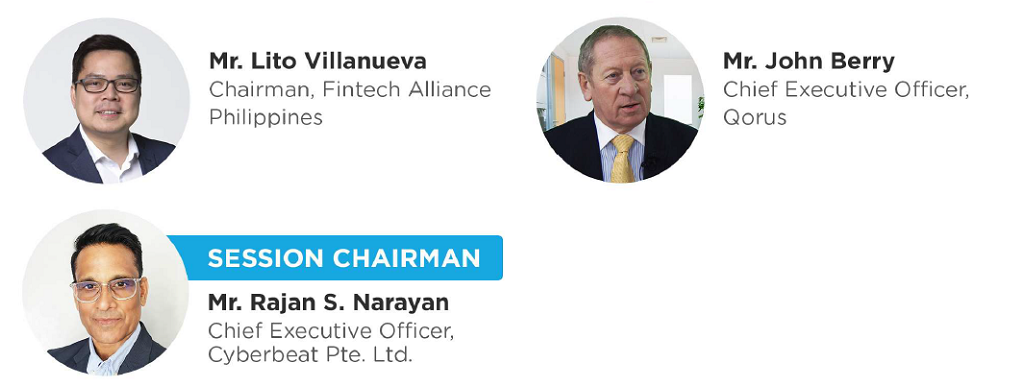
Chaired by Mr. Rajan S. Narayan, Chief Executive Officer, Cyberbeat Pte. Ltd. Sub-Session One focused on “Fintech Revolution: Impact on the Banking Industry” and featured speakers who examine the impact of fintech on payments and lending in Asia, focusing on the new technologies and services entering the market, the level of disruption faced by banks, and the regulatory response to these new developments.
Invited Speakers included
Mr. Lito Villanueva, Chairman, Fintech Alliance Philippines, who shared his views and experience on how and where Asian banks can partner with Fintech organizations for their digital strategies and plans on how to be part of the Fintech ecosystem, and cited some of the programs implemented by Rizal Commercial Banking Corporation aimed at providing solutions to empower its customer base to have unfettered access to their finances through the use of technology and innovation.
Mr. John Berry, Chief Executive Officer, Qorus, who described the new playing field brought about by the growing presence of Fintech companies which he described as the evolution stage of banking, in which banks may need to adopt a different product development approach, different ways to engage their customers, different ways to exploit technology, different business struggling point, different people culture, different organization and decision processes, different KPIs and financial focus, different long-term perspectives, and different partnership objectives.
The presentations of Mr. Villanueva and Mr. John Berry can be downloaded HERE.
The 4th session, 1st subsession, of the 38th ABA Conference can be viewed here.
Sub-Session Two
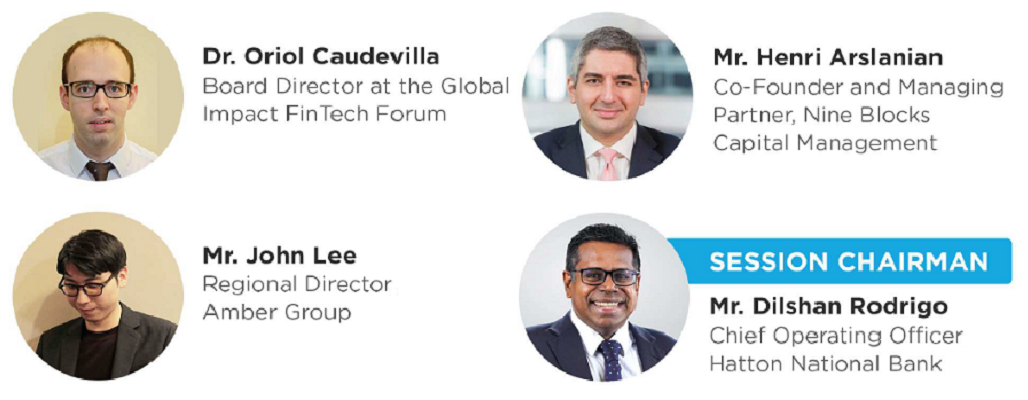
Sub-Session Two addressed the topic “The Future of Digital Currency” and was chaired by Mr. Dilshan Rodrigo, Chief Operating Officer, Hatton National Bank. Subject experts and industry leaders shared their thoughts and perspectives on trends and developments in the era of digital currency since it started in 2012-2013, the role that commercial banks and other FIs and regulatory bodies have played in the new ecosystem, and how they see its future will be.
Invited Speakers included:
Dr. Oriol Caudevilla, Board Director at the Global Impact FinTech Forum, who provided an overview on the current status of Central Bank Digital Currencies (CBDCs), highlighting some of the main projects in Asia and worldwide.
Mr. Henri Arslanian, Co-Founder and Managing Partner, Nine Blocks Capital Management, who talked about the latest global cryptocurrency trends, what bankers need to know, and how to prepare themselves and their respective organizations to adequately meet these trends and the opportunities they provide.
Mr. John Lee, Regional Director, Amber Grou, who shared the activities of his organization aimed at helping banks and its other clients build up their digital assets by providing them a full range of digital asset services spanning investing, financing, and trading.
The presentation of Mr. John Lee can be downloaded HERE.
The 4th session, 2nd subsession, of the 38th ABA Conference can be viewed here.
Sub-Session Three
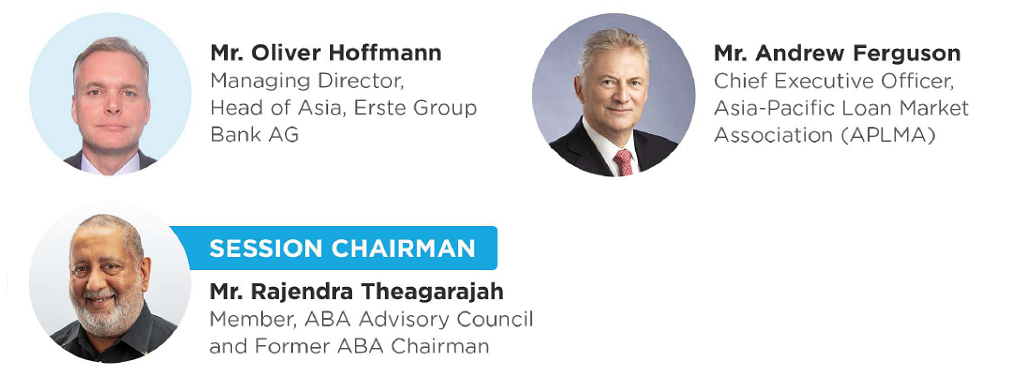
Sub-Session Three dwelt on “Shifts in the Banking System: LIBOR and Others.” Chaired by Mr. Rajendra Theagarajah, Member, ABA Advisory Council Member and Former Managing Director/CEO of Hatton national Bank, the session invited speakers who elaborated on their views on what banks should be doing to prepare for the end of LIBOR and what to include in the checklist when developing a transition plan that is customized to their specific needs and risk management guidelines.
Invited Speakers included:
Mr. Oliver Hoffmann, Managing Director, Head of Asia, Erste Group Bank AG, who provided updates on risk-free rates (RFR); compared old world benchmarks and new world benchmarks in RFR; status of different US Dollar Libor contracts after June 30, 2022, and provided checklist for banks (for Treasury, for Retail, and cor Corporate)
Mr. Andrew Ferguson, Chief Executive Officer, Asia-Pacific Loan Market Association (APLMA), who made a presentation on the current status of LIBOR transition, the role of APLMA in assisting its members in the transition process, what remains to be done and what lies ahead, and what should banks be doing.
The presentations of Mr. Oliver Hoffmann and Mr. Andrew Ferguson can be downloaded HERE.
The 4th session, 3rd subsession, of the 38th ABA Conference can be viewed here.
